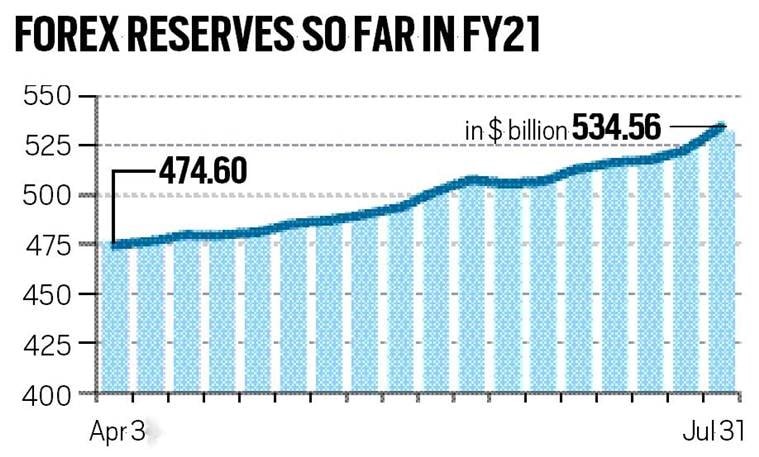India’s foreign exchange reserves have reached a new milestone, crossing the $600 billion mark in November 2023. This significant achievement reflects the resilience of India’s economy and the prudent management of its external finances.

Image: indianexpress.com
Forex Reserves: A Lifeline for Economic Stability
Foreign exchange reserves refer to the assets held by the central bank of a country in foreign currencies, gold, and special drawing rights (SDRs). These reserves are crucial for maintaining economic stability as they provide a cushion against external shocks such as currency fluctuations and capital outflows.
By holding foreign exchange reserves, the central bank can intervene in the foreign exchange market to stabilize the exchange rate of its domestic currency. This intervention ensures that the currency remains within a desired range, facilitating international trade and maintaining price stability. Moreover, forex reserves provide the resources necessary for making payments for essential imports, such as oil and machinery.
Factors Contributing to India’s Forex Strength
Several factors have contributed to the increase in India’s forex reserves:
- Inflows from Foreign Direct Investment: Foreign investors have been drawn to India’s growing economy, leading to increased foreign direct investment (FDI) in various sectors.
- Strong Remittances: Indians working abroad send regular remittances back to India, contributing significantly to the country’s forex earnings.
- Stable Exports: India’s exports have remained buoyant in recent years, despite global economic headwinds.
- Prudent Fiscal Policy: The Indian government has maintained a prudent fiscal policy, keeping the budget deficit under control and reducing the need for external borrowing.
Positive Implications for the Indian Economy
The high level of forex reserves has several positive implications for the Indian economy:
- Reduced Inflationary Pressures: Ample forex reserves help stabilize the exchange rate, reducing the pass-through of imported inflation to domestic prices.
- Improved Credit Ratings: A strong forex position enhances India’s credit ratings, making it more attractive for foreign investors and lowering the cost of borrowing.
- Enhanced Economic Confidence: High forex reserves instill confidence in the economy, both domestically and internationally, attracting foreign capital and boosting investment.
- Emergency Buffer: Forex reserves provide a safety net during economic downturns or external crises, allowing the central bank to intervene in the market and support the economy.

Image: howtotradeonforex.github.io
Tips and Expert Advice for Managing Forex Reserves
Based on the lessons learned from the global economic crisis of 2008-09, experts recommend the following tips for managing forex reserves effectively:
- Diversify Reserves: Hold reserves in a variety of currencies to mitigate the risks associated with fluctuations in individual currencies.
- Invest Prudently: Allocate reserves wisely, considering factors such as risk appetite, return potential, and liquidity.
- Enhance Transparency: Disclose the details of forex reserves holdings and investment strategies to promote trust and credibility.
FAQs on India’s Forex Reserves
Q: What is the ideal level of forex reserves for a country?
A: The optimal level of forex reserves varies depending on factors such as the size of the economy, its openness to trade, and its level of external debt. Generally, a reserve cover of around three months of imports is considered adequate.
Q: How does the RBI manage forex reserves?
A: The Reserve Bank of India (RBI) manages forex reserves by investing in a diversified portfolio of foreign securities, gold, and SDRs. The RBI also intervenes in the foreign exchange market to stabilize the exchange rate when necessary.
Indian Forex Reserves In November
Conclusion
India’s strong forex reserves position reflects the sound fundamentals of the economy and the government’s commitment to maintaining macroeconomic stability. The high level of reserves provides a cushion against external shocks, reduces inflationary pressures, and enhances economic confidence. It is important for policymakers to continue to prudently manage forex reserves to ensure their sustainable growth and contribute to the long-term prosperity of the Indian economy.
Are you interested in learning more about India’s forex reserves and its impact on the economy? Share your questions or comments below, and let’s engage in a discussion.






